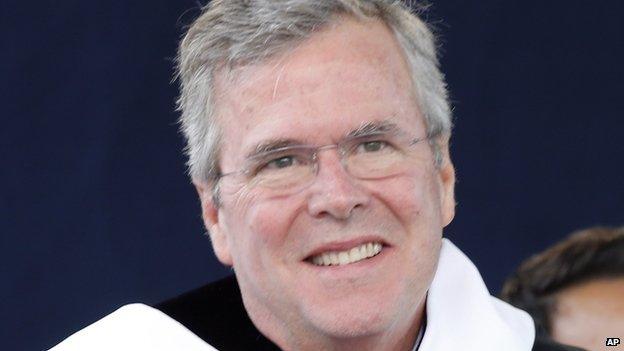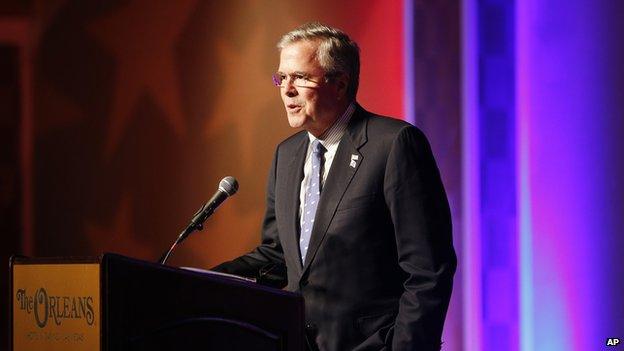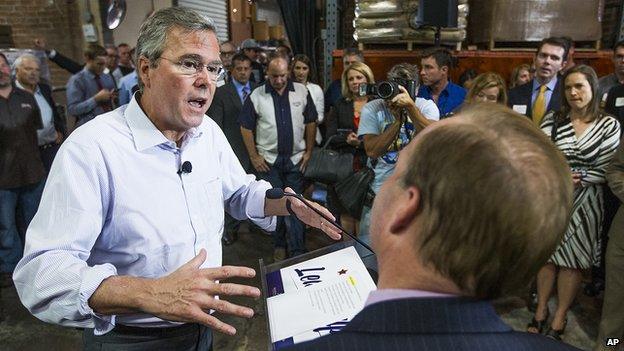Jeb Bush: Four days, four answers on Iraq
- Published

On Thursday Jeb Bush made his fourth (and final?) attempt at answering a simple question about the Iraq War: "Knowing what we know now, would you have authorised the invasion?"
Here's a brief look at a week in words that the former Florida governor almost certainly wants to put behind him.
Monday - Heck, yeah
The fateful question first cropped up during an interview, external with Megyn Kelly of Fox News.
"I would have," Mr Bush said. He then went on to answer a seemingly different question about whether it was the right decision with the information at the time.
"And so would have Hillary Clinton, just to remind everybody," he said. "And so would almost everybody that was confronted with the intelligence they got."

"In retrospect, the intelligence that everybody saw, that the world saw - not just the United States - was faulty," he continued. "And in retrospect, once we invaded and took out Saddam Hussein, we didn't focus on security first."
"By the way, guess who thinks that those mistakes took place as well? George W Bush," he concluded. "Yes, I mean, so just for the news flash to the world, if they're trying to find places where there's big space between me and my brother, this might not be one of those."
Tuesday - Pardon me?
Mr Bush's comments caused a frenzy - not just from the Democratic Party and liberal gadfly Jon Stewart, external of The Daily Show, but from right-leaning commentators and competing aspirants for the Republican presidential nomination.
And so Mr Bush sat down for a radio interview, external with conservative kingmaker Sean Hannity, who asked for clarification.
"I interpreted the question wrong, I guess," he said. "I was talking about, given what people knew then, would you have done it, rather than knowing what we know now. And knowing what we know now, you know, clearly there were mistakes as it related to faulty intelligence in the lead-up to the war and the lack of focus on security. My brother has admitted this, and we have to learn from that."
But would he have invaded?
"I don't know what that decision would've been," he replied. "That's a hypothetical. But the simple fact is, mistakes were made, as they always are in life."

Jeb Bush didn't shake the Iraq War questions in Nevada
Wednesday - Won't someone think of the troops?
If Mr Bush was hoping that his Hannity answers would quiet the storm, he had no such luck. During an appearance in Reno, Nevada, he was asked by three separate questioners about Iraq. He answered that it would be hurtful to those who lost loved ones in the war to answer such hypotheticals.
"Going back in time and talking about hypotheticals, what would have happened, what could have happened, I think it does a disservice to them," he said, external. "What we want to be focusing on are what the lessons learned… I think the focus should be on that, on the future."
After the event, a student confronted the former governor, saying: "Your brother created Isis".
"Why are you saying that Isis was created by us not having a presence in the Middle East when it's pointless wars where we send young American men to die for the idea of American exceptionalism?" Ivy Ziedrich asked, external. "Why are you spouting nationalist rhetoric to get us involved in more wars?"
"When we left Iraq, security had been arranged, Al-Qaeda had been taken out," Mr Bush replied, according to the New York Times. "There was a fragile system that could have been brought up to eliminate the sectarian violence."
"And we had an agreement that the president could have signed that would have kept 10,000 troops, less than we have in Korea, could have created the stability that would have allowed for Iraq to progress," he added. "The result was the opposite occurred. Immediately, that void was filled."

Jeb Bush spends a fourth day answering Iraq War questions
Thursday - Heck, no
Another day brought another answer - this time one that might stick.
"Here's the deal," Mr Bush said at a Tempe, Arizona, event. "If we're all supposed to answer hypothetical questions - knowing what we know now, what would you have done - I would have not engaged. I would not have gone into Iraq."
Mr Bush now joins fellow Republican presidential hopefuls Marco Rubio, Ted Cruz, Rand Paul and Chris Christie on the record as opposing the invasion - hypothetically and decidedly after the fact, of course.
The only difference is none of those men have brothers who started the war.
- Published1 April 2015
- Published31 March 2015
- Published30 March 2015